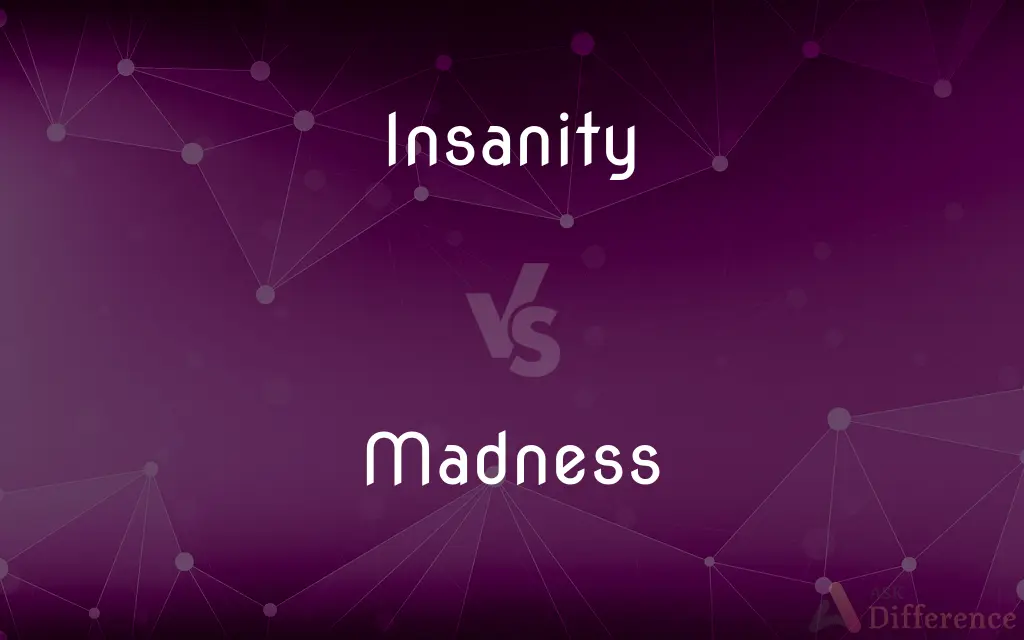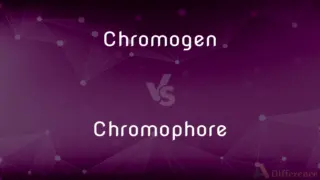Insanity vs. Madness — What's the Difference?
By Tayyaba Rehman & Fiza Rafique — Updated on April 16, 2024
Insanity often refers to a legal term describing one's incapacity to understand the wrongfulness of an action, whereas madness is a more colloquial and broad term for severe mental illness.

Difference Between Insanity and Madness
Table of Contents
ADVERTISEMENT
Key Differences
Insanity is typically used in legal contexts to describe a mental defect severe enough to impede a person's ability to distinguish right from wrong, while madness can describe various degrees of mental health issues without specific legal implications.
Insanity is formally recognized in courtrooms and can affect the outcomes of legal proceedings, whereas madness is generally not a formal diagnosis and is used more loosely in everyday language.
In literature, insanity is often depicted with a focus on the internal struggle and legal ramifications, whereas madness is portrayed with a more dramatic, often chaotic representation.
Medical professionals rarely use the term insanity as a diagnosis; it is specific to legal contexts, while madness is also not clinically used but is common in historical texts and common speech.
Insanity requires specific criteria to be met for legal defenses or considerations, while madness lacks a definitive set of criteria and can refer to any extreme mental instability.
ADVERTISEMENT
Comparison Chart
Definition
Legal incapacity to determine right/wrong
Broad term for severe mental disturbance
Usage
Primarily in legal contexts
Common in everyday language
Medical Recognition
Not used as a medical diagnosis
Also not a medical diagnosis
Literary Depiction
Focus on legal and ethical implications
Often depicted as chaotic or uncontrolled
Outcome Influence
Can determine legal outcomes
No direct legal implications
Compare with Definitions
Insanity
A condition of being seriously mentally ill with legal ramifications.
The court ruled not guilty by reason of insanity.
Madness
A state of having severe mental illness.
His madness was evident in his erratic behavior.
Insanity
Absence of rationality in understanding legal wrongs.
Insanity often involves hallucinations or delusions.
Madness
Extreme foolishness or irrationality.
It was madness to attempt the drive in such weather.
Insanity
A state where one cannot understand the nature of an action.
The defendant's insanity made it difficult to evaluate his motives.
Madness
Historical term often associated with lunacy.
In ancient texts, madness was often cured through exile or isolation.
Insanity
A legal defense in criminal cases involving mental illness.
His lawyer is pleading insanity.
Madness
Used to describe chaotic or wild behavior.
The madness of the crowd at the concert was overwhelming.
Insanity
Legal incapacity recognized by the law.
Insanity is a complex issue in criminal law.
Madness
Colloquial use indicating intense enthusiasm or passion.
There's a fine line between genius and madness.
Insanity
Insanity, madness, and craziness are terms that describe a spectrum of individual and group behaviors that are characterized by certain abnormal mental or behavioral patterns. Insanity can be manifest as violations of societal norms, including a person or persons becoming a danger to themselves or to other people.
Madness
The condition of being mentally deranged.
Insanity
Severe mental illness or derangement. Not used in psychiatric diagnosis.
Madness
Great folly
It was sheer madness to attempt the drive during a blizzard.
Insanity
Unsoundness of mind sufficient to render a person unfit to maintain a contractual or other legal relationship or sufficient to warrant commitment to a mental health facility.
Madness
Enthusiasm; excitement
The madness of Mardi Gras.
Insanity
Incapacity to form the criminal intent necessary for legal responsibility, as when a mental disorder prevents a person from knowing the difference between right and wrong.
Madness
(Archaic) Fury; rage.
Insanity
Incapacity because of a mental disorder to participate adequately as a defendant in criminal proceedings or to understand the imposition of a criminal punishment, particularly the death penalty.
Madness
The state of being mad; insanity; mental disease.
Insanity
Extreme foolishness or irrationality
"The insanity of sending troops into Russia when European peace looked imminent horrified him" (Mary V. Dearborn).
Madness
The state of being angry.
Insanity
Something that is extremely foolish, distinctly irrational, or wildly excited
"twisted forms of musical insanity" (Christopher J. Kelter).
Madness
Rash folly
Insanity
The state of being insane; madness.
The defendant pleaded insanity in the hope of getting a reduced sentence.
Madness
The condition of being mad; insanity; lunacy.
Insanity
The state of being insane; unsoundness or derangement of mind; madness; lunacy.
All power of fancy over reason is a degree of insanity.
Without graceThe heart's insanity admits no cure.
Madness
Frenzy; ungovernable rage.
Insanity
Such a mental condition, as, either from the existence of delusions, or from incapacity to distinguish between right and wrong, with regard to any matter under action, does away with individual responsibility.
Madness
Extreme folly.
Insanity
Relatively permanent disorder of the mind
Madness
Obsolete terms for legal insanity
Madness
An acute viral disease of the nervous system of warm-blooded animals (usually transmitted by the bite of a rabid animal); rabies is fatal if the virus reaches the brain
Madness
A feeling of intense anger;
Hell hath no fury like a woman scorned
His face turned red with rage
Common Curiosities
What is the legal significance of insanity?
Insanity can serve as a defense in legal settings, potentially excusing a defendant from full responsibility for their actions.
What are the criteria for diagnosing insanity?
Insanity is not medically diagnosed but determined through legal criteria focusing on the ability to distinguish right from wrong.
Can insanity be temporary?
Yes, legal insanity can be temporary, influenced by various mental conditions or circumstances.
Is madness recognized in the medical field?
No, madness is not recognized as a medical term; it is more colloquial and less specific.
What types of actions could be considered madness?
Actions that are extremely irrational, dangerous, or defy social norms can be considered madness.
Is there a cultural difference in how insanity is perceived?
Yes, cultural perceptions of insanity can vary, influencing how symptoms and legal defenses are viewed.
Does insanity always excuse criminal behavior?
Not always; it depends on the jurisdiction and specific circumstances of the case.
How is madness depicted in literature?
Madness in literature is often portrayed as chaotic, extreme, and sometimes with a touch of genius or creativity.
How are insanity and madness treated in the criminal justice system?
Insanity can be a defense in criminal cases, while madness has no legal standing.
Can someone recover from madness?
Descriptions of recovery depend on the context and underlying causes as madness is not a clinical condition.
What is the difference between insanity and mental illness?
Insanity is a legal term related to one's capacity to understand legal wrongs, while mental illness is a broader medical term.
Share Your Discovery

Previous Comparison
Digital vs. Decimal
Next Comparison
Chromogen vs. ChromophoreAuthor Spotlight
Written by
Tayyaba RehmanTayyaba Rehman is a distinguished writer, currently serving as a primary contributor to askdifference.com. As a researcher in semantics and etymology, Tayyaba's passion for the complexity of languages and their distinctions has found a perfect home on the platform. Tayyaba delves into the intricacies of language, distinguishing between commonly confused words and phrases, thereby providing clarity for readers worldwide.
Co-written by
Fiza RafiqueFiza Rafique is a skilled content writer at AskDifference.com, where she meticulously refines and enhances written pieces. Drawing from her vast editorial expertise, Fiza ensures clarity, accuracy, and precision in every article. Passionate about language, she continually seeks to elevate the quality of content for readers worldwide.














































